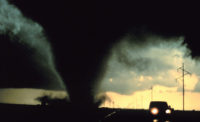People who have allergies may be in for a rough ragweed season this summer and fall, thanks to hotter and wetter weather nationwide.
The flowering weed produces a type of sneeze-inducing pollen known to cause hay fever, a condition that affects as many as 23 million people in the United States, according to the American College of Allergy, Asthma and Immunology (ACAAI). Ragweed has run amok across the country over the past few years, according to allergists. The culprit is extreme weather -- high temperatures and heavy rain -- that creates the perfect environment for ragweed-producing plants to grow. As a result, the allergy season becomes longer and more brutal.
“It really seems like every year it gets a little bit worse,” says Alan Reppert, a senior meteorologist with AccuWeather. “We've been seeing a lot of rain lately, and the ragweed season continues to be bad with plenty of moisture for the plants to grow. We see a lot more growing when we have higher temperatures, as well.”
Each ragweed-producing plant lives only one season, the Asthma and Allergy Foundation of America says, but that plant can produce up to 1 billion pollen grains.
Source: webmd.com




